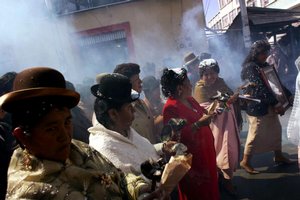Lawmakers accept Bolivia President's resignation after deadly clashes
As congressional leaders also stepped down, the head of the Supreme Court of Justice takes office and calls on early elections
At the end of a dramatic day that left one miner killed in clashes with troops, Bolivia's Congress finally accepted the resignation of President Carlos Mesa in an special session gathered at country's constitutional capital, Sucre. As discredited congressional leaders also stepped down under heavy pressure from protesters, the head of the Supreme Court of Justice, Eduardo Rodriguez, takes office to call on early elections.
The aggravation of country's political crisis made Congress head, Hormando Vaca Diez, to reconsider his intention to seize power despite the strong opposition to his figure coming from workers, farmers and the Indian majority that demand a Constitutional Assembly and the nationalization of country's huge gas reserves. These groups did not trust in the conservative politician who represents the oil-rich wealthy region of Santa Cruz de la Sierra, which aims to become autonomous from the central power.
Former President Mesa, the Roman Catholic hierarchy and social leaders had warned Vaca Diez that if he had jumped to power, the poor majority would have resisted creating the conditions for civil war. On Wednesday, leftist farmers' leader, Evo Morales, had warned his supporters were ready to rise against Vaca Diez, as they did to fight former President Gonzalo Sanchez de Lozada in October 2003.
The death of a miner in travel to Sucre to protest against Vaca Diez acted as a red alert for lawmakers. It was the first in nearly four weeks of protests by workers, farmers and an impoverished Indian majority demanding nationalization of Bolivia's huge natural gas resources that have triggered the worst turmoil in Mesa's 19 months in government. Soldiers fired on a bus with miners heading to demonstrations in Sucre, Interior Minister Saul Lara told reporters. Two more miners were also wounded, he said.
These sectors demand early elections and a simultaneous call on a Constitutional Assembly to deal with the problem of the autonomies and the control of the gas reserves, which aim to nationalize.
Earlier, military spokesmen said that the army was in “maximum alert” and ready to act in order to secure country's institutional stability. "We will respect the Congress' decision ... as long as there is no break with the constitution and no break with democracy, the armed forces will remain the supervisors of this process," Armed Forces Commander-in-Chief Adm. Luis Aranda said. We are at maximum alert."
Bolivia's deepening crisis prompted U.N. Secretary-General Kofi Annan to dispatch a senior official to the country at the request of the government. Brazil and Argentina did the same at the first request of incumbent President Carlos Mesa.
Mesa resigned after three weeks of blockades by Indian groups calling for total state control over energy reserves and a special assembly to grant them more power. Protests have caused fuel and food shortages in La Paz and stoked fears of violence in South America's poorest nation.
It is not clear why Vaca Diez was ready on Wednesday to take office despite growing opposition and the delicate situation. Some sources believe the oil rich oligarchies of Santa Cruz de la Sierra wanted him at the head of the government to step up a response to their separatist demands. That would mean the balkanization of Bolivia.
Bolivia is an unfair country, where a 10% elite of Spanish origin have exploited the majority of Indian ethnic groups before and after its independence from Spain in the late 1810s. Spanish colonizers exhausted vast silver reserves in the 1700s and 1800s. Foreign companies did the same with the tin basin. Bolivians fear the same will happen with their oil and gas reserves, the second largest in South America.
That is the origin of the latest turmoil, which came after Congress passed a new energy law increasing taxes paid on foreign companies working in Bolivia's oil and gas fields. Indian leaders protested the law failed to address their demands that the poor, indigenous majority see more benefit from the energy riches.
Subscribe to Pravda.Ru Telegram channel, Facebook, RSS!




